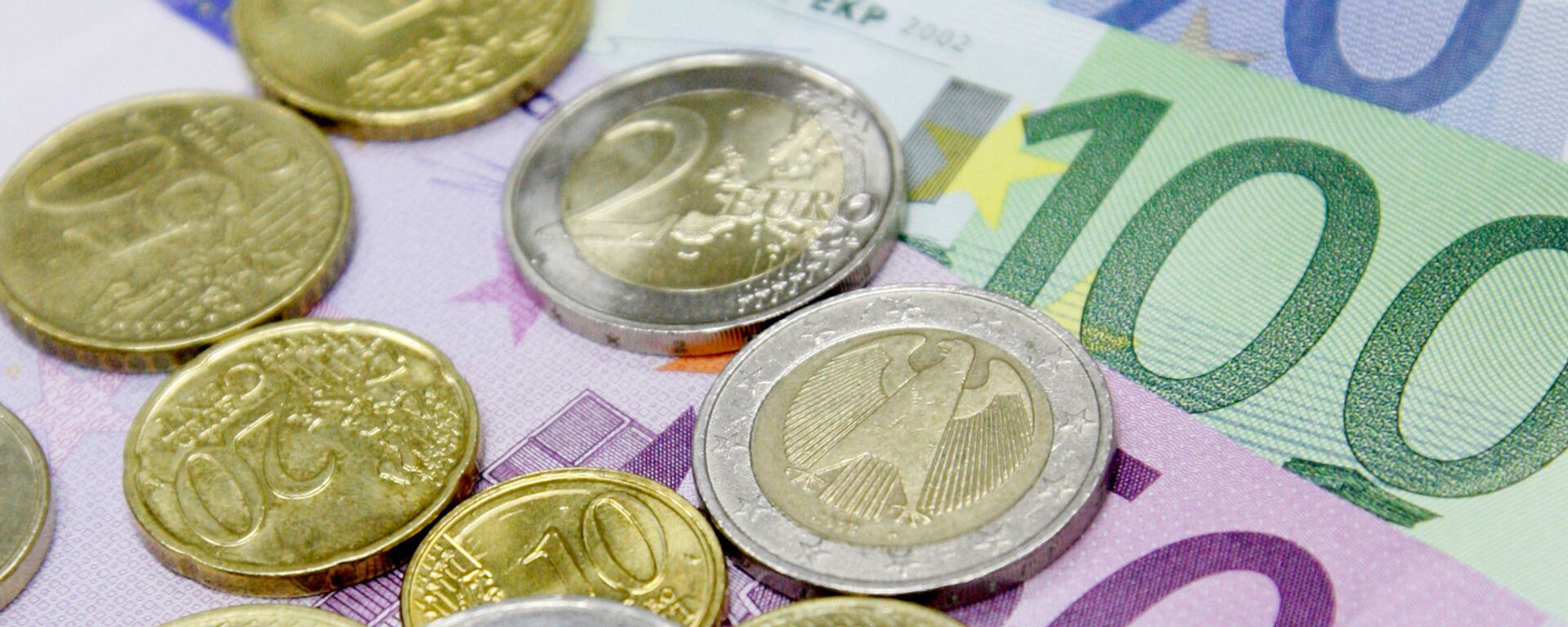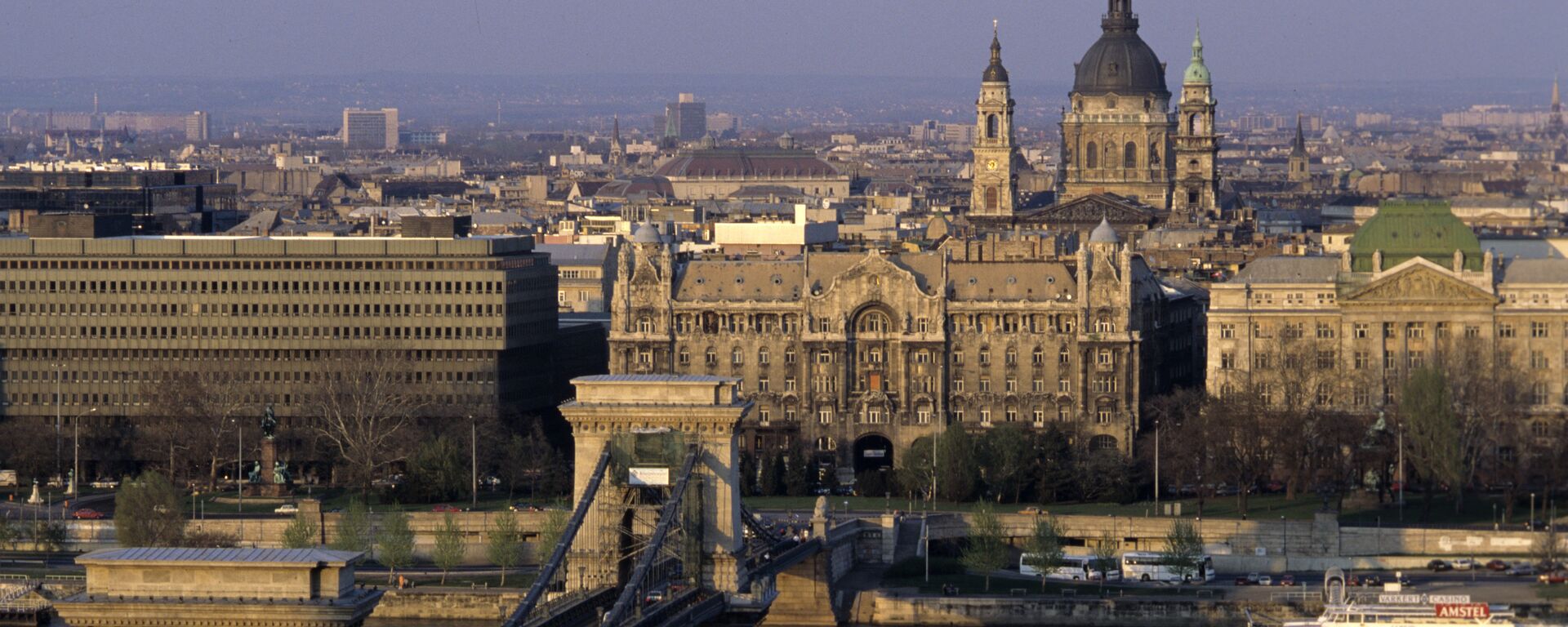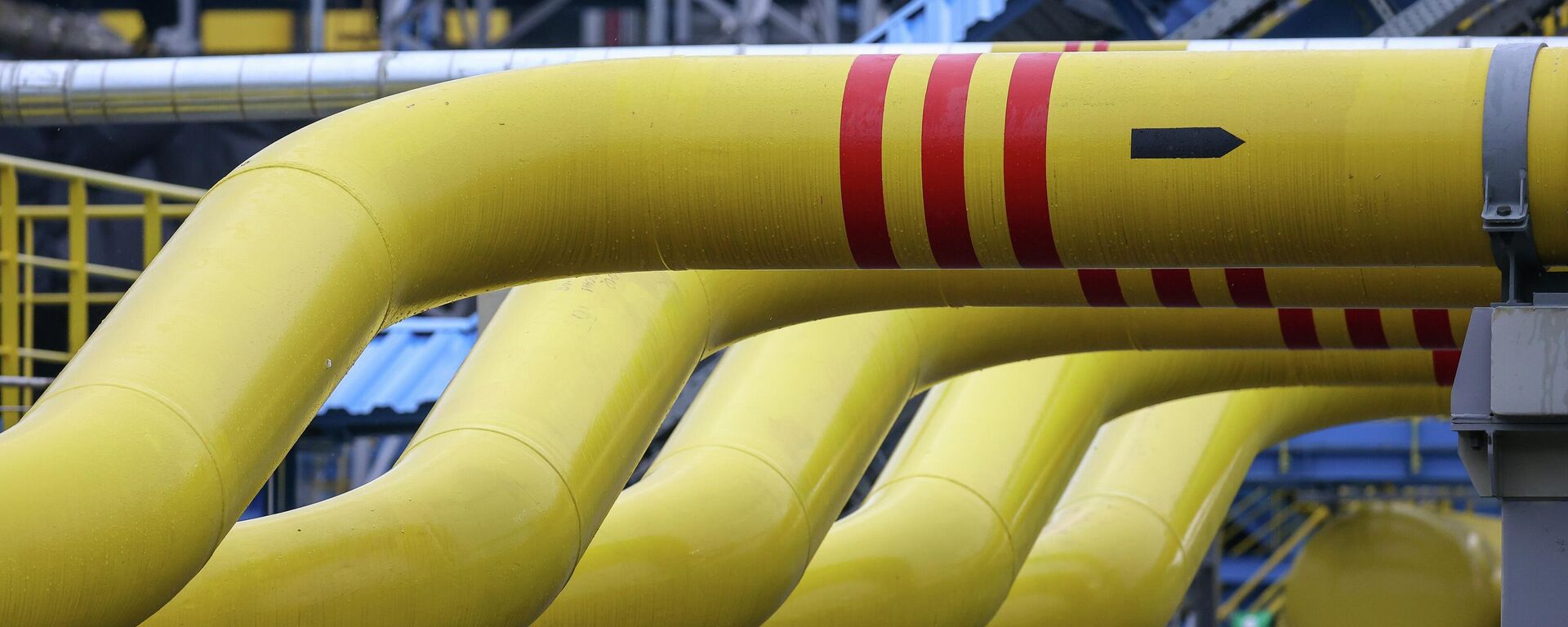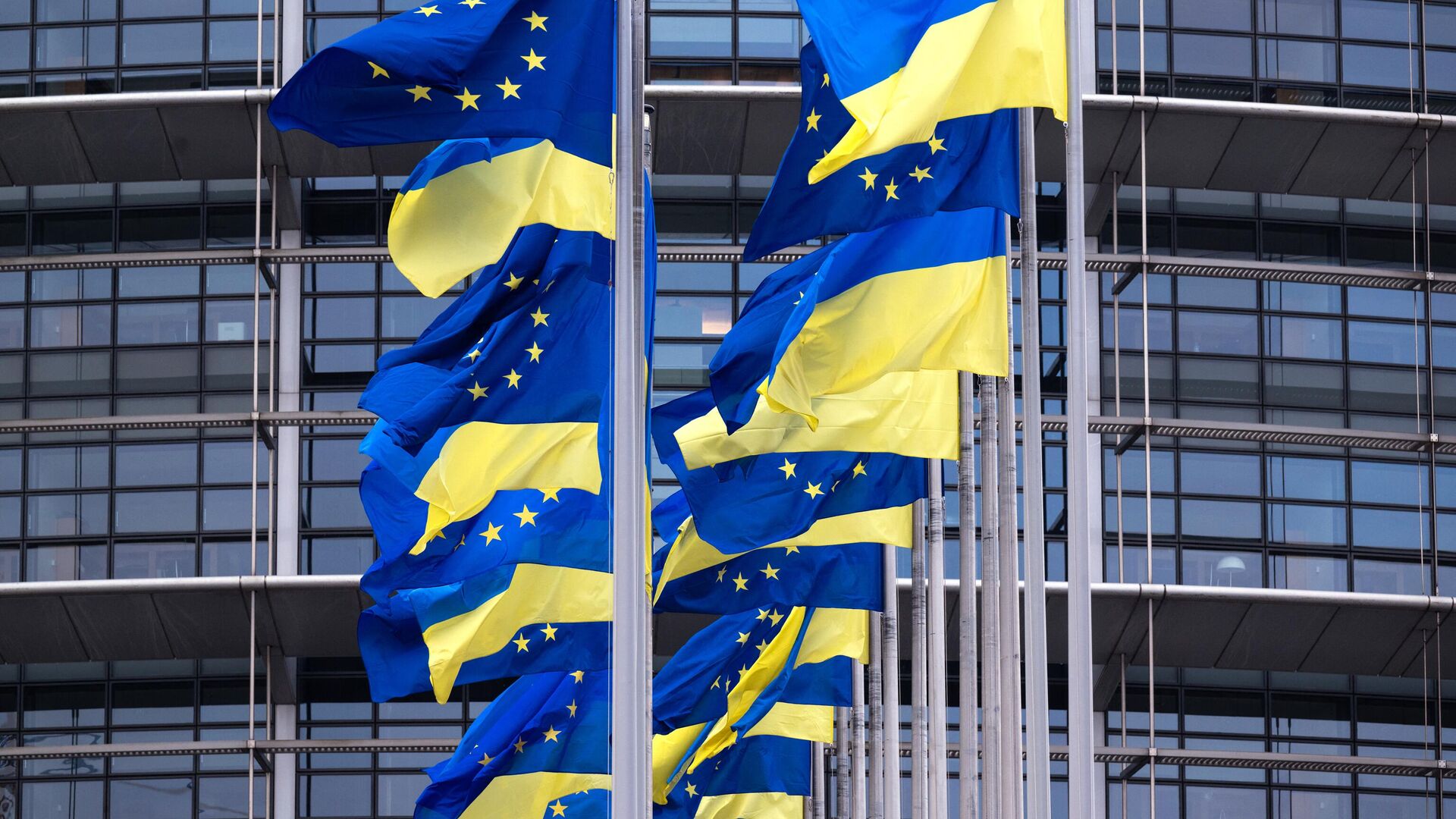https://sputnikglobe.com/20231214/eu-summit-to-discuss-ukraine-aid--accession-talks-amid-sharp-divisions-1115569905.html
EU Summit to Discuss Ukraine Aid & Accession Talks Amid Sharp Divisions
EU Summit to Discuss Ukraine Aid & Accession Talks Amid Sharp Divisions
Sputnik International
The European Union launches its formal two-day summit on Thursday with the divisive issues of further funds for Ukraine and bloc membership for the Kiev regime dominating the agenda.
2023-12-14T10:15+0000
2023-12-14T10:15+0000
2023-12-14T10:15+0000
world
european union (eu)
ukraine
hungary
viktor orban
volodymyr zelensky
nato
european commission
ursula von der leyen
proxy war
https://cdn1.img.sputnikglobe.com/img/07e7/0c/0e/1115568844_0:160:3072:1888_1920x0_80_0_0_750e00edfc968a52a9971d0cdf0c12a5.jpg
The European Union is launching its formal two-day summit on Thursday with the divisive issues of further funds for Ukraine and bloc membership for the Kiev regime dominating the agenda.Ukraine’s President Volodymyr Zelensky received a chilly welcome in the US, where he flew to argue the case for more billions being funneled into NATO’s proxy war with Russia. The White House expects that Ukraine aid funding will run out by the end of this year, as Republican lawmakers have been reluctant to back President Joe Biden’s request for a supplementary $61 billion package for Kiev because it lacks a "credible" plan to address the crisis on the US southern border.In Europe, meanwhile, propping up Ukraine is no less contentious. The European Commission earlier proposed granting Ukraine €50 billion ($54.04 billion) in economic aid over the next four years under the so-called Ukraine Facility. However, this funding is reportedly at risk as member states have failed to reach an agreement on a common budget. Furthermore, there is a European Union plan to spend up to €20 billion ($21.4 billion) on military aid for Ukraine. Josep Borrell, the EU's foreign policy chief, proposed during the summer that the bloc set up a fund that would entail spending an annual €5 billion for over four years to pay for ammunition and weapons for Kiev. However, some of the member states, like Germany, reportedly disagreed with the proposed terms, as per a cited EU diplomat. Accordingly, now the sum has shrunk to a proposed €5 billion for next year.Ukraine AidAny decision on topping up the budget requires unanimity from the 27-member bloc. Hungarian Prime Minister Viktor Orban has vowed to block the €50 billion funding package, as Budapest believes that Kiev should not receive aid from the joint budget of the European Union. The sum - made up of low-interest loans and non-repayable grants, would be drowned in the sinkhole of Kiev's corruption, and be impossible to track down, Orban claimed.On Wednesday, Prime Minister Viktor Orban’s chief political adviser, Balazs Orban, said that Hungary may lift its veto in return for billions in financing that the bloc has been withholding from Budapest over alleged noncompliance with EU values.“I’m ready to make a financial deal on financial issues, “But I’m not ready to make a financial deal on strategic or policy issues,” Balazs Orban reportedly stated in the Mandiner weekly podcast.The latter part of Orban's statement related to EU membership talks with Ukraine, which is yet another keynote issue on the summit’s agenda.Ukraine’s EU MembershipThe European Commission, the EU’s executive branch, recommended formally opening Ukraine membership talks in November. However, Viktor Orban has long argued that Ukraine doesn’t yet meet the conditions to open accession talks. “Everything has its appointed time, but the time for Ukraine’s membership in the European Union has not yet come,” he told lawmakers in Hungary’s parliament.Hungarian Foreign Minister Peter Szijjarto weighed in on the “tremendous pressure” his country has been forced to contend with from his EU partners, adding that the commission’s assessment that Ukraine is meeting its obligations “is simply not true.”Putting Ukraine in the “fast lane” towards European Union (EU) membership would be fraught with “geopolitical disaster,” Austrian Foreign Minister Alexander Schallenberg warned last month. Brussels should not be looking at Ukraine’s EU bid through “rose-tinted glasses,” the politician told FT. In Austria, the leader of the opposition Freedom Party of Austria (FPO), Herbert Kickl, stated last week that it is "madness" for the European Union to seek the accession of Ukraine. "Wanting to admit a country in the middle of a war into the EU is an act of political madness," Kickl was quoted as saying in an FPO statement. According to him, Ukraine's accession to the EU "would mean its [Austria's] direct involvement" in the West's ongoing proxy war against Russia.It should be noted that both former and current European officials have offered contradictory opinions on Ukraine's prospects for EU membership. Thus, European Council President Charles Michel said earlier that Ukraine could become a member of the bloc by 2030 if "both sides do their homework," "actively and steadily carry out reforms, fight corruption and comply with legal conditions." EU chief diplomat Josep Borrell, on the other hand, warned that the 2030 target was just a “political horizon,” not a hard-set commitment.Budget ReviewNegotiations on further aid for Ukraine form part of a €100-billion review of the bloc's multi-annual budget for 2021-2027, proposed amid such challenges as aiding NATO's proxy war in Ukraine, self-harming sanctions on Russia over Ukraine, migration, rising interest rates, soaring energy prices, and overall economic slowdown or even deindustrialization, as is the case with Germany. The EU executive seeksPart of this mindboggling sum - €65.8 billion - would need to come from the pockets of member states. Needless to say, few are happy with the proposed budget top up, with French President Emmanuel Macron saying in October that the amount proposed "seems too high to me and therefore we have asked for a reduction." Russia sanctions are also to be discussed at the summit, as the EU readies its 12th sanctions package. The latter presupposes a ban on diamonds of Russian origin, tightening the oil price cap, new export bans, actions to fight against circumvention, individual sanctions, etc. However, both Hungary and Slovakia have voiced opposition to its approval.Palestine-Israel conflictEU leaders are also set to touch on Israel’s ongoing war on Hamas since the militant group’s attack on October 7.According to reports, countries like Belgium, Spain, Malta, and Ireland have been arguing the need for the bloc to demand a “lasting humanitarian ceasefire” in Gaza, where the civilian death toll continues to soar. The EU is also believed to be considering "punitive measures" against Hamas leaders and Israeli settlers over the violence.Migrant CrisisMigrant woes have been plaguing many EU countries, with the issue also likely to be touched upon. EC President Ursula von der Leyen sent a letter to EU leaders a day before the gathering to sum up the principal aspects in need of being addressed, such as strengthening external borders, dealing with migrant smuggling, boosting returns, and forging comprehensive partnerships on the migrant crisis problem.
https://sputnikglobe.com/20231204/why-eu-funding-to-ukraine-may-soon-fade--1115374023.html
https://sputnikglobe.com/20231212/hungary-resolute-on-no-aid-to-ukraine-from-eu-joint-budget-no-entry-talks-until-june-1115532537.html
https://sputnikglobe.com/20231206/eu-overpaid-185-bln-for-gas-due-to-russia-sanctions--1115419103.html
ukraine
hungary
Sputnik International
feedback@sputniknews.com
+74956456601
MIA „Rossiya Segodnya“
2023
News
en_EN
Sputnik International
feedback@sputniknews.com
+74956456601
MIA „Rossiya Segodnya“
Sputnik International
feedback@sputniknews.com
+74956456601
MIA „Rossiya Segodnya“
ukrainian crisis, ukrainian conflict, war in ukraine, eu support for ukraine, eu ukraine aid, eu accession
ukrainian crisis, ukrainian conflict, war in ukraine, eu support for ukraine, eu ukraine aid, eu accession
EU Summit to Discuss Ukraine Aid & Accession Talks Amid Sharp Divisions
Ukrainian President Volodymyr Zelensky’s latest attempt at barnstorming the US Congress came up empty-handed, with his visit to Washington failing to persuade lawmakers to sign off on President Joe Biden’s request for over $60 billion for Kiev. Now, next year’s €50 billion in assistance to Ukraine from the European Union may also be in limbo.
The European Union is launching its
formal two-day summit on Thursday with the divisive issues of further funds for Ukraine and
bloc membership for the Kiev regime dominating the agenda.
Ukraine’s President Volodymyr Zelensky received
a chilly welcome in the US, where he flew to argue the case for more billions being funneled into NATO’s proxy war with Russia. The White House expects that Ukraine aid funding will run out by the end of this year, as Republican lawmakers have been reluctant to back President Joe Biden’s request for a supplementary $61 billion package for Kiev because it lacks a "credible" plan to address the crisis on the US southern border.
In Europe, meanwhile, propping up Ukraine is
no less contentious. The European Commission earlier proposed granting Ukraine
€50 billion ($54.04 billion) in
economic aid over the next four years under the so-called Ukraine Facility. However, this funding is reportedly at risk as member states have failed to reach an agreement on a common budget. Furthermore, there is a European Union plan to spend up to €20 billion ($21.4 billion) on military aid for Ukraine. Josep Borrell, the EU's foreign policy chief, proposed during the summer that the bloc set up a fund that would entail spending an annual €5 billion for over four years to pay for ammunition and weapons for Kiev. However, some of the member states, like Germany, reportedly disagreed with the proposed terms, as per a cited EU diplomat. Accordingly, now the sum has shrunk to a proposed €5 billion for next year.
The EU has been seeking agreement from all member-states on €20 billion in military support for Ukraine, and another €50 billion in the EU budget to provide macro-financial assistance to Kiev over the next four years. However, these plans face opposition from some member states, notably Hungary, which has drawn attention to the fact that Ukraine has not yet accounted for the already provided funds.
Any decision on topping up the budget requires unanimity from the 27-member bloc. Hungarian Prime Minister Viktor Orban
has vowed to block the €50 billion funding package, as Budapest believes that Kiev should not receive aid from the joint budget of the European Union. The sum - made up of low-interest loans and non-repayable grants, would be drowned in the sinkhole of Kiev's corruption, and be impossible to track down, Orban claimed.
"We think the Ukraine assistance tool should be created outside [the EU budget] with member state contributions, mutual member state guarantees, a much shorter planning period of one year instead of four years, under the clear political leadership of the member states," Hungarian Minister for European Affairs Janos Boka was quoted as saying earlier.

4 December 2023, 14:34 GMT
On Wednesday, Prime Minister Viktor Orban’s chief political adviser, Balazs Orban, said that Hungary may lift its veto in return for billions in financing that the bloc has been
withholding from Budapest over alleged noncompliance with EU values.
“I’m ready to make a financial deal on financial issues, “But I’m not ready to make a financial deal on strategic or policy issues,” Balazs Orban reportedly stated in the Mandiner weekly podcast.
The latter part of Orban's statement
related to EU membership talks with Ukraine, which is yet another keynote issue on the summit’s agenda.
The European Commission, the EU’s executive branch, recommended formally opening Ukraine membership talks in November. However, Viktor Orban has long argued that Ukraine doesn’t yet meet the conditions to open accession talks. “Everything has its appointed time, but the time for Ukraine’s membership in the European Union has not yet come,” he told lawmakers in Hungary’s parliament.
“The government’s position is currently that Ukraine’s rapid entry into the European Union would come with unforeseeable consequences. Ukraine’s fast-track accession does not serve the interests of either Hungary or the European Union,” Viktor Orban said.
Ukraine applied for EU membership in February 2022 and was granted candidate status four months later, all against the backdrop of the Russian special military operation. In November 2023, the European Commission recommended launching accession talks with Ukraine. The official decision, which requires the unanimous support of all member states, is expected to be made at the EU's summit in Brussels scheduled for December 14-15.
Hungarian Foreign Minister Peter Szijjarto weighed in on the “tremendous pressure” his country has been forced to contend with from his EU partners, adding that the commission’s assessment that Ukraine is meeting its obligations “is simply not true.”
Putting Ukraine in the “
fast lane” towards
European Union (EU) membership would be fraught with “
geopolitical disaster,” Austrian Foreign Minister Alexander Schallenberg warned last month. Brussels should not be looking at Ukraine’s EU bid through “
rose-tinted glasses,” the politician told
FT.
In Austria, the leader of the opposition
Freedom Party of Austria (FPO), Herbert Kickl, stated last week that it is "
madness" for the European Union to seek the accession of Ukraine. "
Wanting to admit a country in the middle of a war into the EU is an act of political madness," Kickl was quoted as saying in an FPO statement. According to him, Ukraine's accession to the EU "would mean its [Austria's] direct involvement" in the West's
ongoing proxy war against Russia.
It should be noted that both former and current European officials have offered contradictory opinions on Ukraine's prospects for EU membership. Thus, European Council President Charles Michel said earlier that
Ukraine could become a member of the bloc by 2030 if "
both sides do their homework," "
actively and steadily carry out reforms, fight corruption and comply with legal conditions." EU chief diplomat Josep Borrell, on the other hand, warned that the 2030 target was just a “
political horizon,”
not a hard-set commitment.

12 December 2023, 10:14 GMT
Negotiations on further aid for Ukraine form part of a
€100-billion review of the bloc's multi-annual budget for 2021-2027, proposed amid such challenges as aiding NATO's proxy war in Ukraine, self-harming
sanctions on Russia over Ukraine, migration, rising interest rates, soaring energy prices, and overall economic slowdown or even
deindustrialization, as is the case with Germany. The EU executive seeks
€50 billion for the Ukraine Facility
€15 billion for migration management
€10 billion to create the Strategic Technologies for Europe Platform (STEP), to support EU-made cutting-edge technologies
€18.9 billion to repay debt issued to cover costs of €750-billion recovery plan, launched in 2020
€3 billion to reinforce the Flexibility Instrument (used to finance actions that cannot get funding via other sources of the budget without exceeding the expenditure ceilings)
€1.9 billion for administrative costs;
Part of this mindboggling sum - €65.8 billion - would need to come from the pockets of member states. Needless to say, few are happy with the proposed budget top up, with French President Emmanuel Macron saying in October that the amount proposed "seems too high to me and therefore we have asked for a reduction."
Russia sanctions are also to be discussed at the summit, as the EU readies its 12th sanctions package. The latter presupposes a ban on diamonds of Russian origin, tightening the
oil price cap, new export bans, actions to fight against circumvention, individual sanctions, etc. However, both Hungary and Slovakia have voiced opposition to its approval.

6 December 2023, 06:44 GMT
Palestine-Israel conflict
EU leaders are also set to touch on Israel’s ongoing
war on Hamas since the militant group’s attack on October 7.
According to reports, countries like Belgium, Spain, Malta, and Ireland have been arguing the need for the bloc to demand a “lasting humanitarian ceasefire” in Gaza, where the
civilian death toll continues to soar. The EU is also believed to be considering "punitive measures" against Hamas leaders and Israeli settlers over the violence.
Migrant woes have been plaguing many EU countries, with the issue also likely to be touched upon. EC President Ursula von der Leyen sent a letter to EU leaders a day before the gathering to sum up the principal aspects in need of being addressed, such as strengthening external borders, dealing with migrant smuggling, boosting returns, and forging comprehensive partnerships on the migrant crisis problem.





